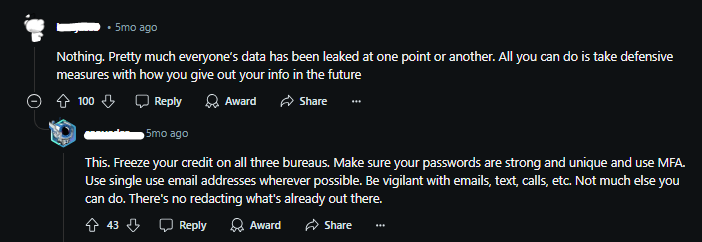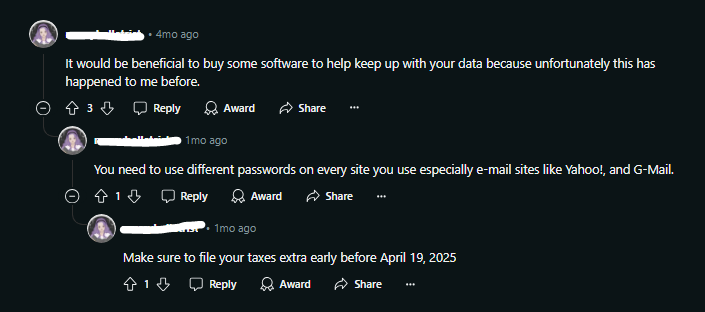Table of Content
- How Can I Check If My SSN is Posted on the Dark Web?
- What Should I Do to Protect My SSN from Dark Web Leaks?
- How Did My SSN Appear on the Dark Web?
- Is It Possible to Remove My SSN from the Dark Web?
- Protect Yourself from Online Fraud and Scams With PurePrivacy
- Frequently Asked Questions (FAQs)
- In Conclusion!
Did you know about the National Public Data?
A platform where you can find millions of public records that also offers fraud prevention and background checks.
Recently, a data leak exposed 2.9 billion records from the National Public Data files.
While the government is trying to slide this under the rug, this is a stark reminder of what can happen if your personal information falls into the wrong hands.
Your data is under attack. Avoid being a target victim!
Cybercriminals monitor everything ranging from name, email address, IP address to your SSN and credit card details. According to some studies, SSNs were exposed in 69% of all data breaches last year.
The AT&T hack of April 2024 exposed more than 70 million Social Security numbers to the Dark Web.So, it's essential to recognize the potential risks of data theft and take preventative action to secure your personal data.
This blog post will help you learn about common data breaches, how they occur, and effective preventative measures.
Discover if Your Most Critical Identifiers Have Been Exposed on the Dark Web
Receive timely alerts and actionable insights with PurePrivacy's Dark Web Monitoring.
How Can I Check If My SSN is Posted on the Dark Web?
Unfortunately, there’s no straightforward way to check whether or not your SSN is publicly available on the dark web.
Due to its size and anonymity, the dark web makes it challenging to conduct targeted searches for certain information.
Several services may look for personal information on the dark web but cannot provide total coverage.
It's crucial to remember that your SSN may still be vulnerable even if you can't find it on the dark web.
Numerous data breaches occur without prompt public notice, and your data may be included in a bigger dataset that has yet to be found.
What Should I Do to Protect My SSN from Dark Web Leaks?
If your Social Security number (SSN) has been hacked, here are the steps to protect yourself against identity theft.

Examine Your Bank Accounts
Check your credit report frequently for unauthorized activity and suspicious bank account transactions. For more security, consider signing up for a credit monitoring program.
Set Strong, Complex Passwords
You can use a password manager to create unique passwords that are hard to crack. You can enable two-factor authentication for added security.
Freeze Your Credit Cards
This stops all unauthorized individuals from obtaining your credit report and enables them to open new accounts in your name. It is a safer choice than a scam alert.
Report the Crime
Report the compromise to the FTC at IdentityTheft.gov to obtain a recovery plan and evidence of innocence. To block your Social Security number (SSN) electronically, call the Social Security Administration (SSA) and file a police report.
Get Identity Theft Protection
Think about obtaining an IRS Identity Protection PIN (IP PIN). Criminals are prevented from using your SSN to make false tax returns by this special code.
How Did My SSN Appear on the Dark Web?
A data breach most certainly resulted in your Social Security Number (SSN) appearing on the dark web. Here are a few typical ways that this can occur:

Data Breaches
Hackers frequently take huge quantities of personal data, including SSNs, from businesses or organizations that suffer from data breaches.
Phishing Attacks
Phishing scams, via phony websites, emails, or other channels, deceive people into divulging personal data.
Malware Infections
Data on infected devices can be stolen by malware, including ransomware. Your Social Security number could be among the stolen data if your device is compromised.
Stolen Devices & Outdated Apps
If your phone, laptop, or other devices carrying it are stolen, hackers can obtain your Social Security number. Your data is vulnerable to assaults if you use old software with known flaws.
Weak Passwords
Passwords that are simple or simple to figure out can be compromised. You need to create complex and unique passwords that are hard to crack.
Is It Possible to Remove My SSN from the Dark Web?
The short answer is No.
It is almost impossible to take your SSN down once it is visible on the Dark Web.
Rather, concentrate on finding any more compromised data and taking precautions to keep yourself safe.
Law enforcement may step in in major circumstances, but this is not a given.
To protect your online identity, remaining aware, proactive, and informed is essential.
Protect Yourself from Online Fraud and Scams With PurePrivacy
PurePrivacy is a comprehensive privacy and security platform that protects your online activities and personal data.
It uses cutting-edge technologies and intuitive features to allow you to take charge of your online activities and personal anonymity.
- Use Dark Web Monitoring to search the dark web proactively for compromising information about you, including credit card numbers, emails, and passwords.
- Use Tracker Blocker to block websites and outside trackers from gathering and using your browsing information.
- Use Remove My Data to request data removal from approved data brokers repeatedly.
- Use Social Privacy Manager to run a thorough scan or rescan of your social media accounts and get tailored suggestions for enhancing your privacy settings.
Monitor the Dark Web 24/7
Get notified immediately if your personal data is discovered on the dark web, giving you time to take immediate precautions against any threats.
Block Thousands of Internet Trackers
Ensure a more individualized and safe online experience by protecting your privacy and blocking targeted advertising.
Send Automated Data Removal Requests
With the in-app dashboard, you can monitor the status of the data removal requests and get weekly reports.
Manage Social Privacy Settings
Boost your privacy and stay anonymous by safely deleting your search history from different social media sites.
Frequently Asked Questions (FAQs)
-
What would happen if someone discovered my Social Security number on the dark web?

Remember that if you find your SSN on the dark web, your other personal data may also have been compromised. If the breach is overlooked, passwords to your personal accounts can also be compromised.
-
Are Social Security numbers secure?

By the time you're an adult, your Social Security number has been entered into so many systems that it's hard to keep it 100% secure. However, you can take precautions to protect your account numbers better.
-
Can I change my SSN?

You can modify your Social Security number, but only in certain situations permitted by the agency, like identity theft or threats to your personal safety. Additionally, you must provide the necessary paperwork to back up your request for a new number.
-
How do hackers use my Social Security number?

A dishonest person can use your Social Security number to obtain further personal information about you. Identity thieves may use your number and good credit to apply for additional credit in your name.
In Conclusion!
Social Security numbers on the dark web seriously threaten people's financial security and privacy.
Therefore, it's critical to take strong security measures to protect personal data, such as creating strong passwords, staying away from phishing schemes, and using PurePrivacy with a VPN.
PurePrivacy protects you from identity theft and other associated risks by encrypting your internet traffic.





